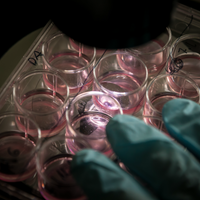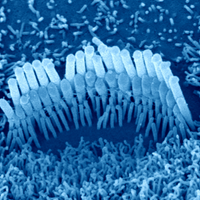iPSC

A Beating Heart on a Chip
Aparna Nathan, PhD | Mar 26, 2024 | 4 min read
Researchers used organ chips to mimic conditions that help heart cells mature.

Reprogramming Astrocytes: Unlocking DLX2’s Potential to Mend the Brain
Nele Haelterman, PhD | Jan 23, 2023 | 3 min read
Scientists discover how to convert the brain’s glial cells into multipotent neural stem cells.

Leveraging Stem Cells to Create Better Disease Models
The Scientist | 2 min read
Clive Svendsen, Meritxell Huch, Ameen Salahudeen, and Maksim Plikus will discuss the latest advances in using patient-derived stem cells to create more accurate disease models.

Stem Cell Lines Riddled With Undetected Mutations
Dan Robitzski | Aug 12, 2022 | 4 min read
Most of the human induced pluripotent stem cells stored at major cell line repositories and used in research harbor thousands of DNA errors, a study finds, highlighting the need for improved quality control measures.

Stem Cell Transplant Treats Parkinson’s Disease in Monkeys
Roni Dengler, PhD | Feb 7, 2022 | 4 min read
Personalized stem cells improved motor symptoms and depression signs in monkeys modeling Parkinson’s disease, paving the way for trials in human patients.

Harnessing Stem Cells to Treat Disease
The Scientist | 1 min read
In this webinar, Kim Vanuytsel and Ryan Flannigan will discuss cutting-edge technologies for improving stem cell-based therapies.

New Protocol Advances Toward Lab-Made Universal Red Blood Cells
Diana Kwon | Dec 17, 2020 | 4 min read
Researchers report a new way of generating the cells from induced pluripotent stem cells in hopes they will one day be used in blood transfusions.

New iPSC Culture Medium Promises Weekends Off at Low Costs
Katarina Zimmer | Jan 20, 2020 | 5 min read
Biologists have published a DIY recipe for human induced pluripotent stem cell maintenance, which they estimate costs 3 percent of commercial media prices.

An Optimized Culture Medium for Induced Pluripotent Stem Cells
The Scientist Creative Services Team in collaboration with Bio-Techne | 2 min read
An animal component-free culture medium provides a safe and robust alternative for maintaining induced pluripotent stem cells.

Gene Editing Makes Cells Evade Immune Attack In Vitro
Emma Yasinski | Dec 12, 2019 | 3 min read
To advance the possibility of off-the-shelf cardiac cell therapies, scientists devise an engineered cardiac stem cell that avoids stimulating a detrimental immune attack.

Oct4, Considered Vital for Creating iPSCs, Actually Isn’t Needed
Emma Yasinski | Nov 8, 2019 | 3 min read
Dropping the transcription factor from the four so-called Yamanaka factors reduces the efficiency of inducing the production of stem cells, but the resulting cells are of greater quality.

Central Nervous System Modeling with iPSC-Derived Cells
The Creative Services Team in collaboration with BrainXell | 1 min read
Bryan Black and Lucas Thal will discuss their experiences screening hiPSC-derived neural cells to understand chronic pain and neuroinflammation.

Woman Receives First Corneal Transplant Made from iPS Cells
Emily Makowski | Sep 3, 2019 | 2 min read
The patient’s vision has improved since the procedure, and her cornea remains clear.

Clinical Trial Underway for a Natural Killer Cell Therapy
Chia-Yi Hou | May 7, 2019 | 3 min read
The cells, derived from induced pluripotent stem cells, are in testing as an immunotherapy for cancer patients with solid tumors.

The Scientist's LabTalk Podcast - Episode 2
The Scientist | 1 min read
Surviving Stress: The mysteries of neuronal survival and neurodegeneration

Bioethicists Concerned over Japan’s Chimera Embryo Regulations
Katarina Zimmer | Apr 4, 2019 | 5 min read
Many researchers see the move to relax the rules as a welcome change, yet some are worried the revisions don’t take public concerns enough into consideration.

Opinion: Ethical Challenges in Using iPS Cells to Treat Paralysis
John D. Loike and Martin Grumet | Mar 7, 2019 | 3 min read
Uncertainties about the cells’ risk profiles and the potential for hyping unproven therapies mean scientists and the media must tread carefully.

Japan Approves iPS Cell Therapy Trial for Spinal Cord Injury
Catherine Offord | Feb 18, 2019 | 1 min read
The treatment will be tested in a handful of patients who suffered nerve damage in sports or traffic accidents.

The Biggest Science News of 2018
Kerry Grens | Dec 27, 2018 | 7 min read
From disastrous scientific setbacks to the upending of scientific dogma and the end of a 40-year search for a protein
